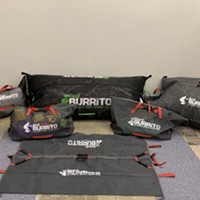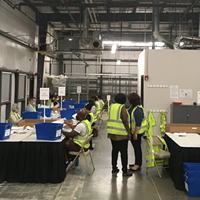The never-ending battle for veterans
War is only the beginning of a soldier's struggle
By Sara PattersonThe war on terror has produced more than 1.6 million veterans since it began in 2001 and has changed, for better or worse, all veterans' access to mental-health treatment.
"We have to choose our battles," says Blake Bourne, director of community initiatives for Charlotte Bridge Home, a nonprofit organization that aims to assist the area's estimated 55,000 veterans. The surge of post-9/11 veterans — "the greatest influx of veterans since World War II," says Bourne — spurred rapid development of mental- and behavioral-health treatments for active-duty military and veterans, including advancements in alternatives like animal-assisted therapies. But this influx of vets, coupled with increased engagement from older veterans seeking help, has overtaxed an already strained system of treatment providers.
"What we see now is a lot of veterans who got out between the '60s and the '90s who weren't properly transitioned [to civilian life]," Bourne says. "Because of the new influx of veterans and the awareness of these issues, those that were poorly transitioned are now identifying themselves."
Bourne served as an infantry officer from 2006 to 2012 and was deployed to Iraq twice. Upon his return, he noticed a change in the military's approach to mental-health issues, such as PTSD. "It was taken much more seriously by the time I got out," he says. After facing the difficulties of transitioning to civilian life — everything from finding health-care providers to navigating a new city — Bourne joined Charlotte Bridge Home to help other veterans facing the same struggles.
"If a veteran is needing mental health care, they should get enrolled with the VA first to get primary care," says Carol Waters, spokeswoman for the Department of Veterans Affairs in Charlotte. But Bourne says the increase of veterans seeking care (Charlotte's VA clinic saw more than 24,000 veterans last year alone) means some veterans must wait at least 10 months between registering with the VA and receiving assistance through that agency. That's "too long to wait when you need care," says Bourne, and the need for treatment and counseling in the interim is where smaller organizations like Charlotte Bridge Home come in. But the center is one of several nonprofits to change its policies in response to heightened post-9/11 demand for treatment.
Charlotte Bridge Home uses licensed social workers to identify mental-health issues with veterans. It also provides free counseling. As of last summer, the organization assisted pre-9/11 veterans who had served an average of 2.5 years and had been out of the military for 15 to 20 years. But overburdened staff social workers and overtaxed resources prompted the completely donation-funded center to enact more stringent eligibility requirements in January. Post-9/11 veterans still receive a full evaluation and short-term counseling, but pre-9/11 veterans are now typically referred elsewhere for treatment. As a result, Charlotte Bridge Home now serves primarily post-9/11 veterans who have been out of the military for three years or less, with an average of six years in active service.
The requirements are not unique to Charlotte Bridge Home. Anyone who seeks assistance through the Wounded Warrior Project, a well-known nationwide nonprofit, must be a post-9/11 veteran with either physical or psychological injuries from serving in an area of combat. (Charlotte Bridge Home, on the other hand, considers all veterans who left the military after Sept. 11, 2001 to be "post-9/11" veterans, regardless of whether they were in recent combat.)
Wounded Warrior funds the kind of smaller alternative therapy courses that Bourne hopes will make new advancements in PTSD treatment. But as benefactors of Wounded Warrior, these programs — often the only alternatives for vets stuck in limbo with the VA, Bourne says — must also adhere to the national group's post-9/11-vets-only standard.
Triple Play Farm, in Davidson, offers therapy with horses for veterans with PTSD and other mental-health conditions. This year, it began partnering with the Wounded Warrior Project, which funds the farm's sessions with veterans through a grant. The center employs a team of licensed clinical social workers, specialists experienced with handling horses, and a small herd to treat veterans who have "run out of luck in traditional therapy," says Kris Batchelor, Triple Play's owner and founder.
The unconventional treatment emerged in the last decade after physical therapy using horses became widely accepted in the medical community. The therapy uses horses to identify and address mental-health issues that might not be as apparent in a typical counseling setting. Clients in the program go through a traditional intake process, or a meeting with a counselor in an office setting to set clinical goals, such as overcoming anxiety, but then pick from the herd and spend sessions working with their chosen horse — mostly on the ground, not in the saddle — and their therapist. "Navigating the relationship with the horse is a starting point for healing," says Batchelor, the daughter of a Vietnam War veteran. "Equine Facilitated Psychotherapy sessions are a real-time therapy, so issues like anxiety and fear emerge in the session itself." In a typical therapy session, counselors guide patients through activities with horses — like observation, haltering, leading and grooming — designed to explore issues related to self-awareness, confidence and trust.
It's a therapy uniquely suited to veterans, Batchelor says. It offers the opportunity to be outdoors, involves more doing than talking, and appeals to those struggling with PTSD in particular because they identify with the hypervigilance of large-prey animals.
"Horses are herd animals and need a confident leader to trust for survival," says Shauna Smith, adaptive sports specialist for the Wounded Warrior Project. For example, "if a horse senses fear or anger in a warrior, it will reflect those emotions in body language and walk away. If a horse senses calmness and confidence in a warrior, it will allow that warrior to lead it."
Wounded Warrior pays for 10 Triple Play therapy sessions, provided the client is a post-9/11 veteran. Ten Charlotte veterans have enrolled since January, attending sessions once per week or once per month, but still, says Batchelor, "the need for alternative interventions for PTSD outstrips the supply."
The center will face an ethical challenge once the 10 Wounded Warrior-funded sessions run out for veterans who need continued treatment. "It doesn't feel good to make them move on," says Batchelor. "It feels artificial and unfair. We don't want to pull the rug out from under them if there's still a need for treatment." The center is exploring options to offer a sliding session fee scale for veterans who need more than 10 sessions or who don't meet Wounded Warrior's eligibility requirements.
For the latter, obtaining any treatment at all can mean fighting against falling into what Bourne calls a "gap in care." Pre-9/11 veterans continue to call on Charlotte Bridge Home citing long waits for VA care, though Waters says when veterans apply for treatment at Charlotte's VA center "we try to get them in within two weeks." Private therapy in the interim isn't economically feasible for many vets and their families, Bourne says, though a grant from Carolinas Healthcare Systems allows Charlotte Bridge Home to help some veterans get private care in acute situations. Otherwise, "unfortunately, there are not a whole lot of [no-cost or low-cost] places to send them right now," says Bourne. About 344,000 veterans nationwide are stuck in this gap, waiting for claims processing, according to a report released by the VA this month.
With organizations like Wounded Warrior and Charlotte Bridge Home unlikely to reverse new eligibility requirements — case loads are heavy even when limited to post-9/11 veterans, over 130,000 of whom have been officially diagnosed with PTSD since 2001 — focus is shifting from repairing the past to learning from it. Social workers at Charlotte Bridge Home now try to establish contact with veterans through community events rather than waiting for veterans to contact them with immediate needs, hoping to catch issues like PTSD as they emerge rather than waiting for them to become dire.
"There isn't always an easy answer," Bourne says. "But we have to get it right for this generation."
Editor's Note: This story has been updated from its original version.Speaking of...
Latest in News Feature
More by Sara Patterson
-
N.C. lawmakers criminalize disclosure of fracking chemicals
May 23, 2014 -

SNAP out of luck
May 14, 2014 -

Got raw milk?
May 14, 2014 - More »
Calendar
-

Queen Charlotte Fair @ Route 29 Pavilion
-

NEW WINDOW GALLERY-Pat Rhea-ACRYLIC PAINTINGS-April 05-30 2024 VALDESE, NC 28690 @ New Window Gallery/Play It Again Records
- Through April 30, 12 p.m.
-

TheDiscountCodes
-

Wine & Paint @ Blackfinn Ameripub- Ballantyne
-

Face to Face Foundation Gala @ The Revelry North End













